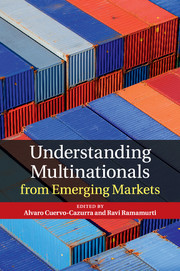Description
Understanding Multinationals from Emerging Markets
Coordinators: Cuervo-Cazurra Alvaro, Ramamurti Ravi
This book offers the latest analytical thinking on emerging market multinationals (EMNCs) and identifies key issues for research by scholars and consultants.
Language: English
Subject for Understanding Multinationals from Emerging Markets:
Understanding Multinationals from Emerging Markets
Publication date: 07-2015
Support: Print on demand
Publication date: 07-2015
Support: Print on demand
Understanding Multinationals from Emerging Markets
Publication date: 06-2014
340 p. · 15.7x23.5 cm · Hardback
Publication date: 06-2014
340 p. · 15.7x23.5 cm · Hardback
Description
/li>Contents
/li>Biography
/li>
Why have relatively poor and underdeveloped countries been able to spawn so many global firms in the last two decades? Are emerging market multinationals (EMNCs) really different from successful multinationals from developed economies? This book tackles these and other fundamental theoretical questions about EMNCs. A distinguished group of researchers assesses the unique strategies and behavior of successful EMNCs, from the Chinese telecommunications firm Huawei to the Indian conglomerate Tata, to the South African beverages firm SABMiller. They address a range of topics, such as the drivers of internationalization by EMNCs; their distinctive process capabilities; how they catch up with established rivals on technology; how state ownership or business-group affiliation affects their behavior; and why they sometimes relocate their headquarters to advanced economies. This book will appeal to scholars and graduate students in global strategy and international business, as well as consultants of multinational companies, looking for state-of-the-art analysis of EMNCs.
Foreword; 1. Introduction Alvaro Cuervo-Cazurra and Ravi Ramamurti; Part I. EMNCs in Historical Perspective: What Is New?: 2. Theoretical debates on multinationals from emerging economies Yair Aharoni; 3. What does history add to EMNC research? Andrew Godley; Part II. Unique Capabilities of EMNCs: Do They Exist?: 4. Modern international business theory and emerging market multinational companies Alan M. Rugman and Quyen T. K. Nguyen; 5. The limits of 'new' multinational enterprises: institutions, systems, and 'members-only' location advantages Rajneesh Narula; 6. The evolution of EMNCs and EMNC thinking: a capabilities perspective Donald Lessard; 7. EMNCs and catch-up processes: the case of four Indian industries Kristin Brandl and Ram Mudambi; Part III. The Internationalization of EMNCs: Different Drivers?: 8. The global expansion of EMNCs: paradoxes and directions for future research Peter J. Williamson; 9. Process perspectives on the growth of emerging economy multinationals Klaus E. Meyer; 10. Migrating EMNCs and the theory of the multinational Helena Barnard; 11. Business groups, institutional transition, and the internationalization of firms from emerging economies Torben Pedersen and Tamara Stucchi; 12. Country of origin effects on internationalization: insights from Brazil Afonso Fleury and Maria Tereza Leme Fleury; Part IV. A Path for the Future: 13. Conclusion: an agenda for EMNC research Alvaro Cuervo-Cazurra and Ravi Ramamurti; Further reading; Index.
Alvaro Cuervo-Cazurra is Professor of International Business and Strategy at Northeastern University's D'Amore-McKim School of Business. He studies the internationalization of firms, with a special interest in developing-country multinationals, and his geographical area of expertise is Latin America. He also analyzes governance issues, with a focus on corruption in international business. He teaches and consults on global strategy and sustainability. For more information, please visit www.cuervo-cazurra.com.
Ravi Ramamurti is D'Amore-McKim Distinguished Professor of International Business and Strategy and Director of the Center for Emerging Markets at Northeastern University's D'Amore-McKim School of Business. His research and consulting have focused on companies operating in, or from, emerging economies. This is his third volume with Cambridge University Press, the others being Emerging Multinationals in Emerging Markets (2009, edited with J. V. Singh) and The Competitive Advantage of Emerging Market Multinationals (2013, edited with P. W. Williamson, A. Fleury and M.-T. Fleury).
Ravi Ramamurti is D'Amore-McKim Distinguished Professor of International Business and Strategy and Director of the Center for Emerging Markets at Northeastern University's D'Amore-McKim School of Business. His research and consulting have focused on companies operating in, or from, emerging economies. This is his third volume with Cambridge University Press, the others being Emerging Multinationals in Emerging Markets (2009, edited with J. V. Singh) and The Competitive Advantage of Emerging Market Multinationals (2013, edited with P. W. Williamson, A. Fleury and M.-T. Fleury).
© 2024 LAVOISIER S.A.S.




